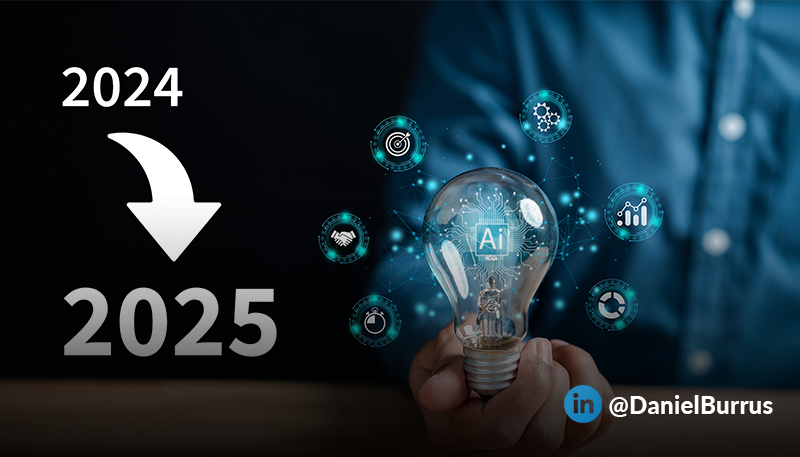Artificial Intelligence (AI) has become a crucial force driving business transformation in 2025. Companies worldwide are leveraging AI to enhance efficiency, elevate customer experiences, and streamline business operations. With AI-powered solutions, businesses can automate repetitive tasks, make data-driven decisions, and create personalized experiences for customers. In this article, we explore the key ways AI is revolutionizing businesses in 2025 and the future implications of this transformation.

1. Enhancing Operational Efficiency
AI is optimizing business operations by automating routine and time-consuming tasks. Companies are integrating AI-powered robotic process automation (RPA) to handle administrative work such as data entry, payroll processing, and customer support. These solutions not only reduce human errors but also increase overall productivity, allowing employees to focus on more strategic tasks.
Moreover, AI-driven analytics are helping businesses predict market trends, optimize supply chains, and improve inventory management. With machine learning algorithms analyzing vast amounts of data, businesses can identify inefficiencies and take proactive steps to enhance operational efficiency.
2. Revolutionizing Customer Experience
Customer experience has become a key differentiator for businesses, and AI is playing a significant role in enhancing it. AI-powered chatbots and virtual assistants provide real-time support to customers, resolving inquiries instantly without human intervention. These bots use natural language processing (NLP) to understand customer queries and deliver accurate responses, improving satisfaction levels.
Furthermore, AI is enabling hyper-personalization in marketing and sales. Companies use AI to analyze customer behavior, preferences, and purchasing patterns to create personalized recommendations and offers. This level of customization leads to increased customer engagement and higher conversion rates.
3. Data-Driven Decision Making
AI enables businesses to make informed decisions based on data rather than intuition. Advanced AI-powered analytics tools process large datasets in real time, identifying patterns and insights that were previously difficult to detect. Business leaders can use predictive analytics to anticipate customer demands, optimize pricing strategies, and mitigate potential risks.
AI also plays a crucial role in fraud detection and cybersecurity. Machine learning algorithms analyze transaction patterns to identify anomalies and prevent fraudulent activities. This proactive approach ensures that businesses remain secure while maintaining customer trust.
4. AI in Human Resources and Workforce Management
The impact of AI extends to human resources and workforce management. AI-powered recruitment tools streamline the hiring process by scanning resumes, assessing candidates’ skills, and matching them with suitable job positions. This reduces the time and effort required to find the right talent.
Additionally, AI-driven employee engagement tools monitor workforce productivity and provide insights into job satisfaction. These tools help HR teams address concerns proactively and create a more positive work environment.
5. Transforming Finance and Accounting
AI is revolutionizing the finance and accounting sectors by automating bookkeeping, tax calculations, and financial forecasting. AI-driven accounting software eliminates human errors, enhances compliance, and improves financial transparency.
Moreover, AI-powered financial advisory systems assist businesses in making strategic investment decisions. By analyzing market trends and economic indicators, AI helps organizations optimize their financial planning and risk management strategies.
6. AI in Supply Chain and Logistics
Supply chain management is another area where AI is making a significant impact. AI-driven predictive analytics optimize logistics, reducing delivery times and costs. AI-powered demand forecasting ensures that companies maintain optimal inventory levels, preventing stockouts and overstocking.
Autonomous vehicles and drones, powered by AI, are transforming transportation and last-mile delivery. These technologies enhance efficiency and reduce reliance on human labor in logistics operations.
7. AI in Marketing and Sales
AI-driven marketing automation tools are helping businesses refine their marketing strategies. AI analyzes customer data to segment audiences, optimize ad placements, and create highly targeted marketing campaigns. Predictive analytics enable sales teams to identify potential leads and personalize their outreach strategies.
Voice assistants and AI chatbots assist customers during the purchasing journey, providing recommendations and answering questions in real time. These tools enhance user experiences and boost sales conversions.
8. Ethical Considerations and Challenges
Despite the numerous advantages of AI, businesses must address ethical concerns and challenges associated with its implementation. AI biases, data privacy, and job displacement are key issues that organizations must tackle responsibly.
Companies must ensure transparency in AI decision-making processes and adopt ethical AI frameworks. Additionally, businesses should invest in reskilling programs to help employees transition into AI-powered workplaces.
Conclusion
AI is transforming businesses in 2025 by enhancing operational efficiency, revolutionizing customer experiences, and driving data-driven decision-making. From HR to finance, supply chain to marketing, AI-powered solutions are reshaping industries and creating new growth opportunities. However, organizations must adopt AI responsibly, addressing ethical concerns while leveraging its full potential.
As AI continues to evolve, businesses that embrace AI-driven innovations will gain a competitive edge in the market. The future of business lies in AI-powered automation, intelligence, and innovation, making AI an indispensable tool for success in the modern world.